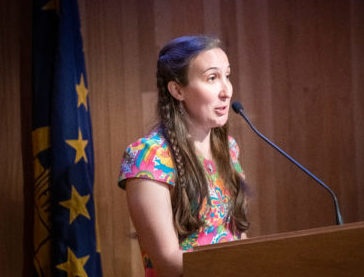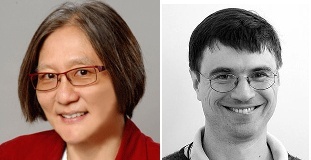Erin Creel, a PhD candidate in UC Berkeley's department of chemistry and research affiliate at the Joint Center for Artificial Photosynthesis, was selected as the 2019 graduate student recipient of the UC Berkeley Chancellor's Award for Civic Engagement for her exceptional commitment to advancing social change through public service. Erin is the steering committee chair for Bay Area Scientists in Schools (BASIS), an organization that brings over 500 free hands-on science and engineering to Bay Area elementary schools annually. Erin's lesson on renewable energy and climate change helps to teach fourth graders the basics of solar, wind, and water power.
Two Lawrence Berkeley National Laboratory (Berkeley Lab) scientists have been elected to the Royal Society of London, the oldest scientific academic society in continuous existence: Inez Fung, faculty scientist, Earth and Environmental Sciences Area, and a professor of earth and planetary science and of environmental science, policy, and management at UC Berkeley, has been elected as a Foreign Member of the Royal Society. Fung models the processes that maintain and alter the composition of the atmosphere and the climate. Martin Head-Gordon, senior faculty scientist, Chemical Sciences Division, and the Kenneth S. Pitzer Distinguished Professor of Chemistry at UC Berkeley, has been elected as a Fellow of the Royal Society of London. Head-Gordon develops and applies methods to predict the electronic structure of new and interesting molecules. He also leads Berkeley Lab’s Gas Phase Chemical Physics program, and is a scientist and principal investigator at the Joint Center for Artificial Photosynthesis, a DOE Energy Innovation Hub, in Berkeley Lab’s Chemical Sciences Division. The two are among the learned society’s 51 new fellows, 10 new foreign members, and one new honorary member. The Royal Society dates back to 1660, and today is the UK’s national science academy with a fellowship of some 1,600 of the world’s most eminent scientists. “Over the course of the Royal Society’s vast history, it is our fellowship that has remained a constant thread and the substance from which our purpose has been realized: to use science for the benefit of humanity,” said society president Venki Ramakrishnan. “This year’s newly elected Fellows and Foreign Members of the Royal Society embody this, being drawn from diverse fields of enquiry – epidemiology, geometry, climatology — at once disparate, but also aligned in their pursuit and contributions of knowledge about the world in which we live. It is with great honor that I welcome them as Fellows of the Royal Society.”

